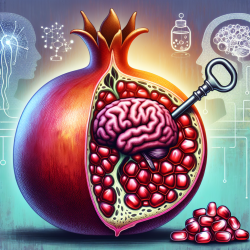Introduction
In the realm of speech-language pathology and cognitive rehabilitation, the quest for innovative, evidence-based strategies is paramount. A recent pilot study, "Pomegranate Supplementation Protects against Memory Dysfunction after Heart Surgery," offers promising insights that could revolutionize our approach to cognitive recovery, particularly in pediatric populations.
The Study: A Brief Overview
Conducted by Ropacki, Patel, and Hartman, this study explored the effects of pomegranate supplementation on memory dysfunction following heart surgery. Patients undergoing elective coronary artery bypass graft and/or valve surgery were administered either pomegranate extract or a placebo from one week before surgery to six weeks post-surgery. Neuropsychological tests assessed memory function at various intervals.
Key Findings
The study revealed that patients receiving pomegranate supplementation not only avoided memory retention deficits but also showed improved memory retention up to six weeks post-surgery compared to baseline. This finding suggests a potential protective effect of pomegranate polyphenols against surgery-induced cognitive decline.
Implications for Practitioners
For practitioners in speech-language pathology, these findings underscore the importance of integrating nutritional considerations into therapeutic interventions. While the study focused on adults, the implications for pediatric therapy are substantial:
- Neuroprotection: Incorporating polyphenol-rich foods, like pomegranates, could enhance neuroprotection strategies, potentially mitigating cognitive deficits in children undergoing surgery.
- Holistic Approaches: Encouraging a holistic approach that includes dietary interventions may improve overall therapy outcomes.
- Further Research: This study invites further exploration into how similar interventions might benefit pediatric populations, particularly those with cognitive impairments.
Encouraging Further Research
The study opens doors for further research into the mechanisms by which pomegranate polyphenols exert their protective effects. Questions remain about the optimal dosage, timing, and potential benefits of other polyphenol-rich foods. Practitioners are encouraged to collaborate with researchers to explore these avenues, enhancing our understanding and application of nutritional interventions in cognitive therapy.
Conclusion
The findings from this study highlight the potential of pomegranate supplementation as a valuable tool in cognitive recovery strategies. As we strive for data-driven decisions in speech-language pathology, integrating such innovative approaches could significantly enhance outcomes for children. By embracing a holistic, evidence-based perspective, we can unlock new potentials in therapy and recovery.
To read the original research paper, please follow this link: Pomegranate Supplementation Protects against Memory Dysfunction after Heart Surgery: A Pilot Study.










